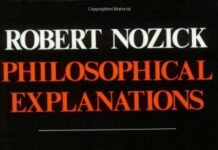
Ebook Info
- Published: 2096
- Number of pages: 242 pages
- Format: PDF
- File Size: 1.83 MB
- Authors: Robert Nozick
Description
Repeatedly and successfully, the celebrated Harvard philosopher Robert Nozick has reached out to a broad audience beyond the confines of his discipline, addressing ethical and social problems that matter to every thoughtful person. Here Nozick continues his search for the connections between philosophy and “ordinary” experience. In the lively and accessible style that his readers have come to expect, he offers a bold theory of rationality, the one characteristic deemed to fix humanity’s “specialness.” What are principles for? asks Nozick. We could act simply on whim, or maximize our self-interest and recommend that others do the same. As Nozick explores rationality of decision and rationality of belief, he shows how principles actually function in our day-to-day thinking and in our efforts to live peacefully and productively with each other.Throughout, the book combines daring speculations with detailed investigations to portray the nature and status of rationality and the essential role that imagination plays in this singular human aptitude.
User’s Reviews
Editorial Reviews: Review “Robert Nozick’s brief, vivid, energetic, intensely personal and enviably clever book attacks head-on the question of what rationality really is.”—John Dunn, The Times Higher Education Supplement”Robert Nozick always attacks his problems in a disconcertingly original way. . . . From Mr. Nozick you always expect fireworks. . . . The questions he addresses are fundamental in the true philosophical sense: Why exactly should we want to act and believe rationally? Why should we formulate principles of action and try to stick to them? The questions are not moral but explicatory. He is not out to argue that unprincipled or irrational behavior is immoral; rather, he invites us to consider what we are trying to do, and what the justification for such behavior is. . . . Sure to attract a great deal of interest.”—Anthony Gottlieb, The New York Times Book Review”To Nozick, rationality and belief are each an evolutionary adaptation to a world that changes in nonregular ways. Our acts resonate with symbolic meaning and ‘stand for’ our principles and beliefs. In this boldly original . . . inquiry which will reward serious students of philosophy, Nozick uses decision theory to propose new rules of rational decision-making that take into account the symbolic, practical, and evolutionary components of our behavior . . . . this challenging treatise champions reason as a faculty that enables us to transcend our mere animal status and to strive toward goals by the light of principles.” ― Publishers Weekly”From Mr. Nozick you always expect fireworks. . . . The questions he addresses are fundamental in the true philosophical sense: Why exactly should we want to act and believe rationally?” ― The New York Times Book Review About the Author Robert Nozick (1938–2002) was the Joseph Pellegrino University Professor at Harvard University. Among his works are Philosophical Explanations and The Examined Life. His Anarchy, State, and Utopia won the National Book Award in 1975.
Reviews from Amazon users which were colected at the time this book was published on the website:
⭐Nozick does an admirable job of summarizing contemporary philosophical thought on rationality and offering his own opinions/theory on what it means to be rational. However, I can’t help but feel that the book is dated in that it fails to incorporate the explosion of scientific work that has been done on the brain both before and after this book was written. Ultimately, rationality will be something that philosophy and science both have something to say about but here the focus is only on the philosophical tradition.
⭐Nozick, a consummate philosopher in the analytical tradition, addresses the central issue of philosophy itself. What is the nature of rationality? If Man is the rational animal that philosophers claim, what are the principles, features, properties, methods, functions, and purposes of reason itself? Nozick concedes any attempt to ground “reasoning” fails, and all reasons for reason are circular, but not viciously circular.For the brevity of the book, Nozick covers considerable territory. He discusses how reason itself functions and the functions themselves (interpersonal, intellectual, overcoming temptation, investment, symbolic utility, and teleological devices), using decision-value (the most technical topic), Newcomb’s Problem, Prisoners’ Dilemma, and other distinctions, to explicate how one arrives at rational belief, the reasons we want rational beliefs, and some rules to obtain it.The most interesting (and disappointing) chapter is on evolutionary considerations. Few philosophers to date raise the specter of evolution at all (unless it is the topic), when, as Nozick rightly suggests, it may have its own overriding features and its own reasons and justifications. He’s clearly on to an important facet and introduces issues that “limit” the need for rationality as well as require it.My principal cavil is that he treats natural selection as a purposive agent without any disclaimers or caveats. Worse, his natural selection’s purposive agency is, of course, teleological. First, that’s bad form, and second, it’s bad (actually wrong) evolutionary science. A subsidiary cavil is that evolution becomes a “rug” under which a-rational, even irrational, decisions may be swept (which may be true, if he is not persuasive).Ultimately, “a rational decision will maximise an action’s decision-value, which is a weighted sum of its causal, evidential, and symbolic utility” (137, passim). And, while rationality is predominately instrumental, it is not exclusively instrumental, giving excellent exemptions and reasons for them.He considers the effect of biases, preferences (“it is a function of the preferences and believes to be rationally coherent and approximately true [and minimally consistent], and it also is a function of the mechanisms that produce such believes and preferences to produce things like that, with those functions” [149]), reflexivity, interpretation, conditionalization, probability, philosophical heuristics, and imagination on the outcomes, regardless of the cause.Overall the book succeeds admirably in capturing the nature of rationality, those features and functions which we expect it to have, why they are important, why rationality remains important for everyone (not just philosophers), some basic rules to achieve it, principles to guide us, and its purposes in human life. He does so with economy, clarity, coherence, consistency, always reflexively to determine necessity and sufficiency. His presentation is paragon for doing and writing philosophy well.
⭐Nozick is famous, always clear-thinking, always expressing himself briefly but to the point. His style makes the book a wonderful philosophical enterprise. But in fact, Nozick is still where social science was 10 years ago. He makes an impressive effort of combining different paradigms, evidentialism, causal theory, cognitive psychology, in one overall approach; he then applies this monstruous creature to old problems and paradoxes. The true reasons of these paradoxes, as was shown, for instance, by Bach (1984), are violations of applicability of classical rationality and decision-making theory. Not surprisingly, Nozick arrives to the same result with quite a different methodology. So, in brief, the book remains a brilliant study of ideas brought into social science years before; Nozick succeeds in beautifully arranging various paradigms. He still fails to be innovative in what concerns foundations.
⭐According the Greek mythology, the rationality was represented by Apollo, which meant the supreme perfection and the astonishing symmetry. In this sense, the author always proposes hisproblems in a disconcertingly original way: ” Why exactly should we want to act and believe rationally ? … Why should we formulate principles of action and try to stick to them ? “As you know, the further discussion of these interesting issues would lead us to establish a large exchange of ideas.”The man is conservator by own nature, but when this tendency weakens, the revolutions tend to preserve it” Ernesto Sabato
⭐thank you for very fast delivery and good quality book!
⭐This was disappointing. Very dull.
Keywords
Free Download The Nature of Rationality in PDF format
The Nature of Rationality PDF Free Download
Download The Nature of Rationality 2096 PDF Free
The Nature of Rationality 2096 PDF Free Download
Download The Nature of Rationality PDF
Free Download Ebook The Nature of Rationality



